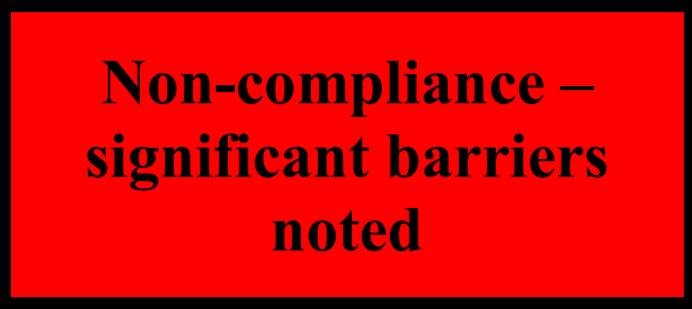DoJ investigators find the City of Portland, Oregon is out of compliance with terms of a plea deal to remedy illegal use of police force.
Click above to read the US Department of Justice, 2016 Compliance Assessment, in USA v City of Portland, Oregon; dated 18 October 2016.
.
In October 2016, the US Department of Justice, Civil Rights Division found the City of Portland non-compliant with terms specified in a 2014 plea deal to remedy illegal use of force by police. Former partner Roger David Hardesty had prompted the position. (See DoJ: Plead that Plea Deal Sanctions are Binding) Community partners, led by the Albina Ministerial Alliance Coalition for Justice and Police Reform (here) urged the same conclusion: the City is not complying with police reform. Feds applied the red banner below to Section IX. Community Engagement and Creation of Community Oversight Advisory Board (COAB).
.
.
COAB was loosely based on Consult Hardesty’s reform oversight model, a Civilian Compliance & Reform Authority. COAB was never presented opportunity to meet with police command staff nor conduct public Town Hall meetings, as provided for in the plea deal. Before placing the body on hiatus, the City never entertained a single suggestion brought forth by citizen volunteers. In addition, the City has for 18 months not convened a Community Police Relations Committee (CPRC), tasked with implementing a 2009 Police Plan to Address Racial Profiling (for which Consult Hardesty ably advocated passage). The City’s Human Rights Commission and Committee on Disabilities have failed to perform as assigned. Despite agreeing not to, the City and police continue to roll out policy without following defined protocols to make it available in draft stage, while still under consideration.
.
.
The DoJ found many failures in the non-collaborative reform effort: in Section IX and elsewhere. At release, the City’s lame-duck Mayor was in closed-door negotiations, prematurely offering the police union a new collective bargaining agreement. In this assessment, investigators recognized “many portions of the Agreement will not only take time to implement, but may require changes to collective bargaining agreements …” They specifically declared the proposed contract did not address “all aspects of the pending accountability issues.” (Pp. 100-101.) The above, 132-page assessment declares flat-out non-compliance in creating an accountability system which prohibits retaliation “against any person who reports misconduct … or cooperates with an investigation of misconduct.” (Pg. 106.) Council on 12 October approved the bargain, without whistle-blower protections or improvements to officer evaluation processes. Council excluded public testimony at passage; police injured dozens as they cleared City Hall following award of $10,000,000 in bounties and pay raises. (See Consult Hardesty call to action at Amend Police Union Contract.)
.
.
Interestingly, the Federally mandated community input mechanism, COAB, was forced into hiatus prior to release of this assessment. As was CPRC. By the terms of the plea deal, COAB was to “leverage the ideas, talent, experience, and expertise of the community.” Had not all input opportunity been shut down, citizen volunteers could have comprehensively knit community concerns with those identified by the DoJ: public participation could have helped distill complex and interlocking failures … to propose holistic and comprehensive fixes.
.
.
UPDATE: On 25 October, and as per the plea deal, US District Judge Michael Simon convened a second, annual status conference to hear the parties’ contentions. (Consult Hardesty advocated for community participation: see Plea Deal Hearing in Federal Court.) Not taking a comprehensive assessment, Simon ordered the City to focus on COAB, and report by 2 December the remedies they contend would bring them into compliance. Though the Agreement calls for “Redefining and restructuring existing community input mechanisms to provide for independent oversight of the Agreement, the City position was to replace the body with a non-public process. (See City’s Draft Concept for Plea Deal Fix.)
.
.
UPDATE: On 7 December Portland Commissioners unanimously voted to appeal Judge Simon’s authority, to order them back to a 31 January status conference. On 14 December, Simon cancelled the pending conference, effectively putting oversight of police reform on hold, pending outcome in US 9th Circuit Court. His order of cancellation is revealing: he factually counters false assertions made by Council at passage of their appeal. (See Judge Cancels Plan to Fix Plea Deal.) In the interim, with oversight in abeyance, neither the parties nor the City-contracted Community Liaison plan to convene Town Halls or citizen-based work groups … to propose holistic solutions to overcome the City’s refusal to embrace public processes and free speech protection.
.

.


